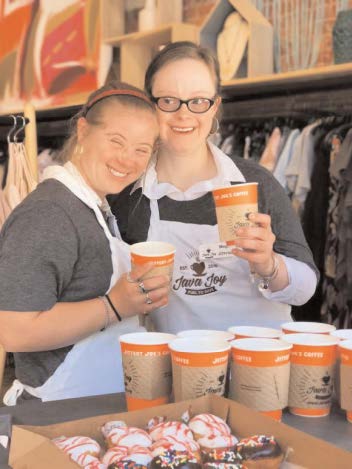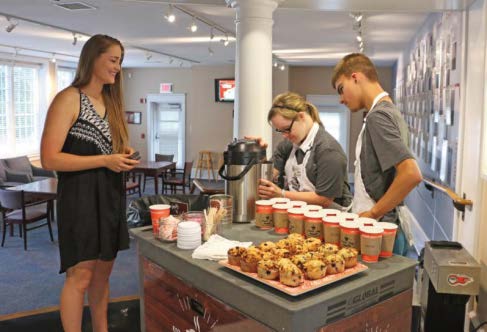BY JAKE SAPP
Oftentimes, as adults with special needs age out of the school system, they lose much of the independence they experienced while in school. Employment and volunteerism can help to restore some of that sense of independence.
Nearly three years ago, a small nonprofit in Northeast Georgia recognized a startling lack of meaningful and sustainable employment opportunities for adults with special needs.
Extra Special People (ESP)'s Java Joy is a mobile coffee cart designed to teach responsibility and life skills by employing adults with disabilities to serve coffee and treats to local businesses through a catering model. The mobile coffee cart also serves another purpose: creating a diverse culture experience for local businesses. ESP's corporate partnership program exists to positively impact business culture by providing the opportunity for employees to engage with people of all abilities.
ESP has been creating opportunities for individuals with disabilities and their families to engage, connect and thrive since 1986. The organization runs weekend and after-school programs, family support programs, and events in addition to summer camp. In June 2016, ESP opened the doors on a 14,000 sq. ft. facility in Watkinsville. ESP strives to provide a safe place that individuals with disabilities can call their own. Java Joy was launched in the fall of 2016 and, since then, has employed 12 adults with special needs who have collectively served more than 200 businesses. While the Java Joy concept is unique in its employment of adults with special needs, what truly sets it apart is the unparalleled customer service by "Joyristas" who are excited for the chance to apply their skills, interact with customers and serve a bigger purpose. With every cup of coffee comes with a warm hug and a trademark phrase, "(In)joy!"
Finding established partners in the community who encourage Java Joy's employees and offer them additional support and training can drive the success of the business and the team. One of Java Joy's partnerships is with Jittery Joe's Coffee, founded and headquartered in Athens, Georgia. Since its inception, Java Joy has been committed to serving a high-quality coffee experience, and the partnership with Jittery Joe's helps to deliver on the commitment. Jittery Joe's has created a unique blend made specially for Java Joy and even invites Joyristas on monthly visits to the roaster to serve customers and learn more about how coffee is made. Their partnership has encouraged our business model and shown Joyristas the bigger role they play within the coffee industry.
After two years in business, this small startup has experienced healthy growth and it has served as a catalyst for personal growth among its staff of Joyristas. Java Joy's mission is to foster a culture of empowerment and autonomy where adults with disabilities can thrive. There, paychecks are not the primary motivation for the Joyristas; rather, the value is found in the intangibles – community, experiences and purpose. Other businesses can learn a thing or two from Java Joy on creating a workplace where satisfaction transcends things like compensation, vacation time and perks, with a turnover rate of zero.
For adults with special needs, the value of getting involved with consistent work or volunteer opportunities cannot be overstated. While Java Joy is a great option for many, it is not the only option available to adults with disabilities. With research and creative thinking, an appropriate fit can be found for all adults with developmental disabilities. Think back to your first job and how that experience shaped your work ethic, self-esteem and world view. Clearly, we all benefit when we rally behind a shared mission to make those same benefits available to adults of all abilities.
INDEPENDENCE
Oftentimes, as adults with special needs age out of the school system, they lose much of the independence they experienced while in school. Relying on parents for all transportation and social interactions can become frustrating. Employment and volunteerism can help to restore some of that sense of independence. Once dropped off, Joyristas are led as employees, with true responsibilities and challenges that make the experience fulfilling. Successes are celebrated and address opportunities for improvement. For these adults, the difference is that their reviews and rejoices are not directed toward their parents—they are communicated directly to the working adults, as they deserve to be faced with as much "real" work experience as they can healthily handle.
I remember seeing this independence exemplified when the Joyristas were asked to work an event that took place during ESP summer camp – a week that many Joyristas look forward to all year long. Instead of complaining about having to leave camp, the Joyristas took it upon themselves to set an alarm, wake up, get ready and meet at the car to head to the event. To sacrifice their time during one of their most anticipated weeks of the year spoke volumes about the impact of this employment experience.

A CUPPA JOY: Joyristas have developed a sense of community and have become a goofy, fun-loving family. Weekly sleepovers, lunch dates and carpooling are never out of the question.
ACCOUNTABILITY
Reminding your adult with disabilities of each everyday task can feel like an uphill battle. Over time, reminders about things like timeliness, hygiene and personal appearance can become frustrating coming from the parents. What we have seen with Java Joy, however, is the power of the "Boss Voice." Hearing those same reminders turned into work requirements can offer your adult a fresh perspective on why each action is important. For many young men with special needs, shaving can be a particularly unpleasant chore; however, to work at a Java Joy event, we require that our male Joyristas have a fresh shave. Employment infuses purpose into personal hygiene and other everyday tasks that might otherwise become burdensome for both parents and young adults.
CONTINUED EDUCATION
One of the biggest fears for parents of adults with special needs is regression. While in school, young people with special needs have access to high support but can experience a drop off when moving to the next chapter of their lives. With all the day-to-day responsibilities of parents, it can be difficult to provide the important mental stimulation your adult child requires to thrive at their highest capacity. Parents may be forced to turn to television and other forms of media to help cover the need for mental stimulation. At Java Joy, Joyristas are challenged with simple math and problemsolving situations that help them develop skills while maintaining sharp mental capacity. For example, one of the more challenging concepts for Joyristas is having them remember how many creams and sugars a customer requested, so learning to write orders down and then seeing that skill translate to a positive customer experience is rewarding and helps to fuel an ongoing desire to learn.
COMMUNITY
For many adults with special needs, loneliness can be the most devastating disability of all. Adults with disabilities often struggle with isolation due to their differences, having no place or community to call their own. It is easy to take workplace relationships for granted, but we must recognize that our work community is often our most consistent outlet for friendship and socialization. At Java Joy, Joyristas have developed more than a sense of community; they have truly become a goofy, fun-loving family. Weekly sleepovers, lunch dates and carpooling opportunities are never out of the question. Recently, one of the Joyristas lost her father, and the way her co-workers rallied behind her was nothing short of inspiring. It was a touching example of the power of community.

SERVICE WITH A SMILE: Java Joy meets people from all walks of life exactly where they are. The joy transferred to the customers is contagious when Java Joy goes into a new business.
PRIDE
A cornerstone of small talk is, "What do you do for a living?" For better or worse, a large part of our identity is defined by what we do and how we contribute to society. The stigma of unemployment can weigh heavily on anyone's self-worth, regardless of ability. Joyristas are proud of the work that they do and the value they add to the communities around them, and they speak openly about their love for their work. At Java Joy, having a source of purpose and pride is a basic human right that everyone should enjoy.
The managers constantly evaluate and re-evaluate the Joyristas in order to set them up for success as much as possible. Some Joyristas thrive in pouring a precise cup of coffee, while others find their niche in their ability to give a big, warm hug. No matter what skills a Joyrista has, Java Joy does its best to highlight them. Recently one of Joyrista with a knack for the baking portion of our business began her own side business called "Meg's Mess." Using the skills she practices at Java Joy, she is able to continue pursuing her passion.
BENEFITS FOR PARENTS & CARETAKERS
In addition to the clear benefits of consistent employment or volunteer opportunities for adults with special needs, participation is equally beneficial to parents and caretakers. The respite from their responsibilities can have a positive impact on mental health. The ability to drop your adult off and have a few hours of "me" time is essential to maintaining emotional wellbeing and can help ease everyday familial stress. Organizations like Java Joy also provide community to parents with similar situations and shared experiences Lastly, the workplace can help to reinforce positive habits from home like healthy eating, good hygiene and appropriate conversation. Having a second place to practice these behaviors is ideal to support what is being taught at home.
The challenges associated with SERVICE WITH A SMILE: Java Joy meets people from all walks of life exactly where they are. The joy transferred to the customers is contagious when Java Joy goes into a new business. finding a place that fits the special needs of your adult can be discouraging, with many parents left thinking that the easiest solution is to stick with routine—but the easiest solutions are rarely the best. It may take time and patience to find a good fit, but when you witness your adult child come home after a challenging day of working or volunteering, it becomes clear just how essential being productive in society is for mental and emotional wellbeing. Don't be surprised even to find that your adult becomes more confident in some of the skills that make him or her unique.
COMMUNITY BENEFITS
One of the most rewarding aspects of Java Joy is the fact that it benefits the community at large, not just the Joyristas. When Java Joy goes into a new business, the joy transferred to the customers is contagious. Many special needs coffee businesses around the country have storefronts where a customer has to make an active choice to engage. Java Joy, however, meets people from all walks of life exactly where they are. Our Joyristas interact with typical adults or children who don't have a lot of experience with the special needs population. Java Joy strives to to break down stigmas and barriers through a delicious cup of coffee and a warm hug.
While Java Joy has been a wonderful resource for the Joyristas in Northeast Georgia, there are many opportunities in which you can help your adult get involved. Animal Shelters, grocery stores, senior care facilities and beauty salons are all great places to check for paid or unpaid work. No matter what the place, employment and volunteerism can help meet the basic human need of wanting to be needed and dramatically improve quality of life. •
ABOUT THE AUTHOR:

Jake Sapp is the Coordinator of Program Operations at Extra Special People, based in Watkinsville, GA. Jake began as a volunteer for ESP while in school at the University of Georgia and serves as Summer Camp Director in addition to leading Java Joy's mobile coffee cart business. Jake is married to Annie Kate and loves spending time kayaking, camping, hiking and working with his dog, Goose.